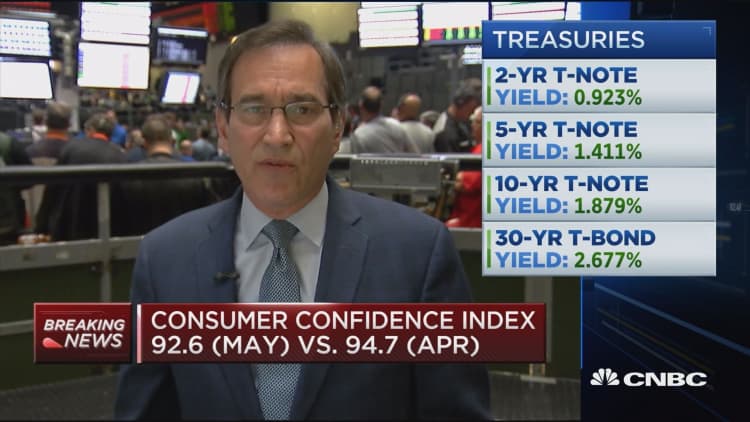
Consumers were feeling less optimistic for the second month in a row, new data said Tuesday.
The Consumer Confidence Index fell to 92.6 in May, the Conference Board said. Economists expected the index to rise to 96 in May, up from April's revised reading of 94.7 in April, according to a Thomson Reuters consensus estimate.
The survey, a closely followed barometer of consumer attitudes, measures sentiment toward business conditions, short-term outlook, personal finances and jobs.
"Consumer confidence declined slightly in May, primarily due to consumers rating current conditions less favorably than in April," said Lynn Franco, director of economic indicators at The Conference Board, a trade organization.
A slightly larger share of consumers in the survey said that current business conditions were "good," but the share that said conditions were "bad" also increased to 21.6 percent, up from 18.2 percent. Consumers' assessment was more split when it came to overall future business conditions, with a growing share of respondents saying both that conditions would improve and that they would worsen.
Meanwhile, 24.4 percent of consumers also said jobs were hard to get, up from 22.8 percent in April. Those anticipating fewer jobs in the future increased to 18.1 percent, up from 16.7 percent the prior month, the survey said.
"Expectations declined further, as consumers remain cautious about the outlook for business and labor market conditions," Franco said, in a statement. "Thus, they continue to expect little change in economic activity in the months ahead."
To be sure, a separate report showed Tuesday that consumer spending surged in April. The Commerce Department attributed the 1 percent bounce in consumer spending to more automobile purchases in households, among other factors. A similar measure, the University of Michigan Consumer Sentiment index, also showed a slight uptick in May when it was reported last week.
"In short, some slippage, in contrast to the pattern in the Michigan index in May," said Jim O'Sullivan, chief U.S. economist at High Frequency Economics. The net result is no clear direction. Neither measure shows much change from last year's average."
What are markets doing? Click here to track stocks.


